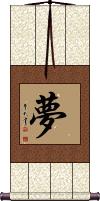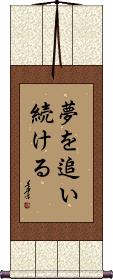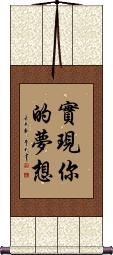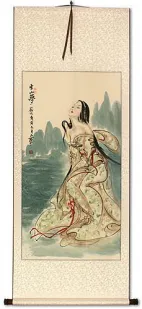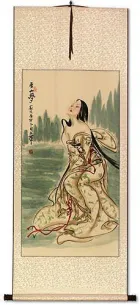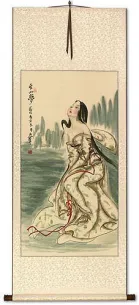Many custom options...
And formats...

Dream Dreams in Chinese / Japanese...
Buy a Dream Dreams calligraphy wall scroll here!
Personalize your custom “Dream Dreams” project by clicking the button next to your favorite “Dream Dreams” title below...
Dream / Dreams
夢 is the very simple word for dreams in Chinese and Japanese.
It can also mean having a vision or simply an illusion.
Dream Big / Big Dreams
Pursue Your Dreams
夢を追い続ける is the Japanese way to express “pursue your dreams,” “follow your dreams,” or “chase your dreams.”
If you have dreams that you want to pursue and make true, this is the phrase for you.
The first character is “dream” or “dreams.” The rest of the characters establish the idea of chasing or pursuing.
Note: Because this selection contains some special Japanese Hiragana characters, it should be written by a Japanese calligrapher.
See Also: Pursuit of Happiness
Realize Your Dreams
This in-stock artwork might be what you are looking for, and ships right away...
Gallery Price: $60.00
Your Price: $36.88
Gallery Price: $200.00
Your Price: $79.88
Gallery Price: $200.00
Your Price: $79.88
Gallery Price: $60.00
Your Price: $36.88
Gallery Price: $400.00
Your Price: $138.88
Gallery Price: $400.00
Your Price: $138.88
Not the results for Dream Dreams that you were looking for?
Below are some entries from our dictionary that may match your Dream Dreams search...
| Characters If shown, 2nd row is Simp. Chinese |
Pronunciation Romanization |
Simple Dictionary Definition |
夢幻 梦幻 see styles |
mèng huàn meng4 huan4 meng huan mugen むげん |
dream; illusion; reverie dreams; fantasy; visions; (personal name) Mugen Dream and illusion, the characteristics of all phenomena. |
幻夢 幻梦 see styles |
huàn mèng huan4 meng4 huan meng genmu げんむ |
fantasy; illusion; dream dreams; visions; phantasms illusion and a dream |
追夢 追梦 see styles |
zhuī mèng zhui1 meng4 chui meng |
to chase a dream; to pursue one's dreams |
逐夢 逐梦 see styles |
zhú mèng zhu2 meng4 chu meng |
to chase a dream; to pursue one's dreams |
夢の夢 see styles |
yumenoyume ゆめのゆめ |
(exp,n) dream within a dream; (beyond) one's wildest dreams; entirely unrealizable dream; pie in the sky |
夢判断 see styles |
yumehandan ゆめはんだん |
(1) interpretation of dreams; dream reading; oneirocriticism; oneiroscopy; (2) The Interpretation of Dreams (book by Sigmund Freud, 1900) |
南柯一夢 南柯一梦 see styles |
nán kē yī mèng nan2 ke1 yi1 meng4 nan k`o i meng nan ko i meng |
lit. a dream of Nanke; fig. dreams of grandeur |
夢の又夢 see styles |
yumenomatayume ゆめのまたゆめ |
(expression) beyond one's wildest dreams; dream within a dream |
夢を語る see styles |
yumeokataru ゆめをかたる |
(exp,v5r) to talk of one's dreams (esp. unrealistic, far-fetched ones); to dream out loud |
夢のまた夢 see styles |
yumenomatayume ゆめのまたゆめ |
(expression) beyond one's wildest dreams; dream within a dream |
Variations: |
yumenomatayume ゆめのまたゆめ |
(exp,n) dream within a dream; (beyond) one's wildest dreams; entirely unrealizable dream; pie in the sky |
Variations: |
yumejiotadoru ゆめじをたどる |
(exp,v5r) (idiom) to have a dream; to walk along the road of dreams |
The following table may be helpful for those studying Chinese or Japanese...
| Title | Characters | Romaji (Romanized Japanese) | Various forms of Romanized Chinese | |
| Dream Dreams | 夢 梦 | yume | mèng / meng4 / meng | |
| Dream Big Big Dreams | 遠大夢想 远大梦想 | yuǎn dà mèng xiǎng yuan3 da4 meng4 xiang3 yuan da meng xiang yuandamengxiang | yüan ta meng hsiang yüantamenghsiang |
|
| Pursue Your Dreams | 夢を追い続ける | yume wo oi tsudukeru yumewooitsudukeru | ||
| Realize Your Dreams | 實現你的夢想 实现你的梦想 | shí xiàn nǐ de mèng xiǎng shi2 xian4 ni3 de meng4 xiang3 shi xian ni de meng xiang shixiannidemengxiang | shih hsien ni te meng hsiang shihhsiennitemenghsiang |
|
| In some entries above you will see that characters have different versions above and below a line. In these cases, the characters above the line are Traditional Chinese, while the ones below are Simplified Chinese. | ||||
Successful Chinese Character and Japanese Kanji calligraphy searches within the last few hours...
